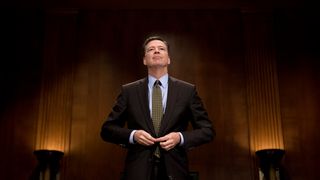At the Aspen Security Conference in the American summer of 2019, Christopher Wray, director of the FBI, told a story of life in Donald Trump's dysfunctional, sometimes dystopian Washington.
Leaving a meeting in DC, he decided to walk back to his office, only to be stopped on the sidewalk by a couple of tourists. The tourists recognised him and said in a friendly way that they were praying for him.
The director thanked them and walked on thinking that he believed in the power of prayer, but even so wondered what had happened during the two hours he had been in that meeting.
Fortunately, the period of the unexpected tweet that forged US national policy and sacked cabinet secretaries and White House staff, has ended. For Wray's predecessor, James Comey, this was his everyday reality.
Comey reserves some of his most stinging criticism for former US Attorney General Bill Barr, who stepped into the office when Trump fired his predecessor, Jeff Sessions.
In Saving Justice: Truth, Transparency and Trust, Comey does not miss Trump, whose administration is dismissed as akin to New York City mobsters, but this book is somewhat different to Comey's earlier political offering, A Higher Loyalty.
Frankly, any book that begins with a US president relating a story of Vladimir Putin boasting about the standard of Russian prostitutes leaves the reader in no doubt as to the author's view of the 45th president. However, Comey reserves some of his most stinging criticism for former US Attorney General Bill Barr, who stepped into the office when Trump fired his predecessor, Jeff Sessions.
"From the beginning, Barr echoed the president, aping his dishonest characterisations of the department's work and appearing to respond to President Trump's self-interested demands for investigations and prosecutions. The Department of Justice was damaged by that.
"It was damaged again when the attorney-general misled the American people about the work of the special counsel investigating the president. And again when the attorney-general intervened in a case involving one of the president's friends. If we are to be a healthy nation, the damage must be repaired." This is Comey's account of his career in the FBI and the Department of Justice as a detective and prosecutor and as a policy-maker and leader. This is highly readable and at times engrossing, with Comey's periods in Richmond, Virginia, New York City and eventually Washington DC, sketched through real episodes.
Comey is detested equally by some Republicans and certain Democrats. He would not genuflect to Trump, but it was his return to the Hillary Clinton emails controversy a week or so before the 2016 election that damaged the Democratic challenger.
Comey seeks to rise above political pressures. He turns to FBI history to guide him when he assumes real power in Washington DC: "When I became FBI director. I obtained a copy of the October 1963 memo from J. Edgar Hoover to attorney-general Robert F. Kennedy seeking permission to conduct electronic surveillance of Dr Martin Luther King Jr.
Comey seeks to rise above political pressures. He turns to FBI history to guide him when he assumes real power in Washington DC.
"At the bottom of the single page memo. Kennedy's signature grants that authority, without limit as to time or places. I put the memo under the glass on the corner of my FBI desk." Comey thus established a clear benchmark for ethical behaviour in the bureau, but he is far from whitewashing its role. He can be refreshingly honest and disarming in his concessions of failure. The FBI's watchdogs missed Dylann Roof's illegal application for a firearm. Roof murdered nine people in a Charleston church. Similarly, the bureau overplayed its technical capacity in promoting the evidentiary value of human hair at crime scenes. Comey strengthens this book by being so open.
President George W Bush understood the need for distance between the Oval Office and the Department of Justice. So did his successor. "A decade later, when I became FBI director, Barack Obama showed that he also knew to stay away from a case. He kept the FBI director at arm's length; his White House counsel stayed in the room even when he interviewed me for the job.
"He warned me that we would never speak casually again once I was leading the FBI, and he kept that commitment. For my part, I knew when he was downstairs playing basketball in the FBI headquarters gym, but, despite my love for the game, I never went down." In a curious way, this book demonstrates that James Comey survived Donald Trump. A better question for the future is, will Trump survive American justice?






